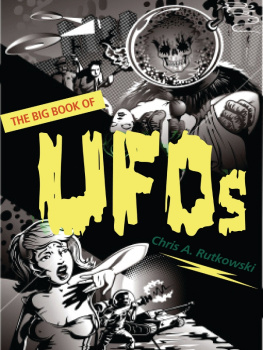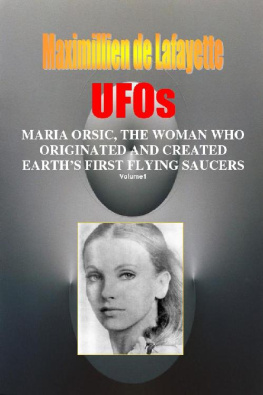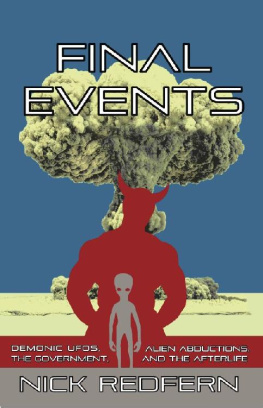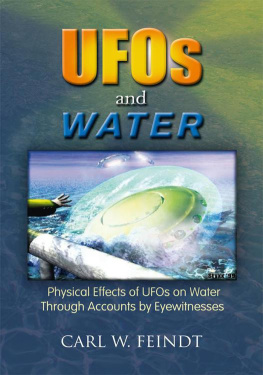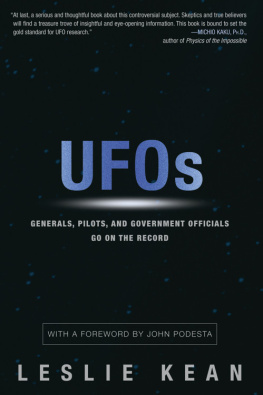Michael Swords - UFOs and Government
Here you can read online Michael Swords - UFOs and Government full text of the book (entire story) in english for free. Download pdf and epub, get meaning, cover and reviews about this ebook. year: 0, genre: Art. Description of the work, (preface) as well as reviews are available. Best literature library LitArk.com created for fans of good reading and offers a wide selection of genres:
Romance novel
Science fiction
Adventure
Detective
Science
History
Home and family
Prose
Art
Politics
Computer
Non-fiction
Religion
Business
Children
Humor
Choose a favorite category and find really read worthwhile books. Enjoy immersion in the world of imagination, feel the emotions of the characters or learn something new for yourself, make an fascinating discovery.
- Book:UFOs and Government
- Author:
- Genre:
- Year:0
- Rating:5 / 5
- Favourites:Add to favourites
- Your mark:
- 100
- 1
- 2
- 3
- 4
- 5
UFOs and Government: summary, description and annotation
We offer to read an annotation, description, summary or preface (depends on what the author of the book "UFOs and Government" wrote himself). If you haven't found the necessary information about the book — write in the comments, we will try to find it.
UFOs and Government — read online for free the complete book (whole text) full work
Below is the text of the book, divided by pages. System saving the place of the last page read, allows you to conveniently read the book "UFOs and Government" online for free, without having to search again every time where you left off. Put a bookmark, and you can go to the page where you finished reading at any time.
Font size:
Interval:
Bookmark:
UFOs and Government
A Historical Inquiry
Michael Swords
Robert Powell
Clas Svahn
Vicente-Juan Ballester Olmos
Bill Chalker
Barry Greenwood
Richard Thieme
Jan Aldrich
Steve Purcell
This book is dedicated to Loren Gross in appreciation for his long years of collegial friendship and his valuable historical contributions to UFO research.
Foreword
Those of us who have devoted an alarming portion of our lives to the reading of UFO literature know how awful much of it is. Those whose intellectual curiosity further encompasses mainstream history and science often find themselves wincing at the way UFO writersnot excluding, by the way, many who present themselves as skepticshave of drawing big conclusions from little evidence. Not surprisingly, the results range from the amateurish and implausible to the paranoid and conspiratorial, and end up being of little more than anthropological interest.
Still, let us be fair. One need not be crazy to wonder at the disconnect between deeply puzzling UFO sightings and oddly apathetic official responses. From the earliest days of the UFO controversy, outside observersand some inside onescould only surmise that a presumably alert U.S. government tasked to protect the nation's safety must be secretly in the know. Could it really be as little alarmed as it appeared about mysterious sights and events that were sparking speculation, even by some scientists, about visitation from elsewhere?
It wasn't as if the phenomena were no more than, say, ambiguous light sources glimpsed by individuals possessed of excessive imagination and dubious probity. Countless sober witnesses spoke of what to all appearances were structured craft, observed under decent viewing conditions (sometimes at close range) and displaying performance characteristics of a sort that ought to have given anyone concerned with aviation security a bracing case of the chills. And worse, fresh sightings of such things were being recorded daily. Some came from instrumented trackings, others from multiple and independent witnesses on the ground, in the air, or both. How reasonable was it to believe that everybody must be radicallyand curiously consistentlymistaken?
The first English-language books on UFOlogy, which saw print in 1950, took as their themes (1) the reality of visitors from space and (2) the strong likelihood that the American government kept that reality hidden behind a high wall of classification. One book, Donald Keyhoe's The Flying Saucers Are Real, held that the Air Force drew its conclusions from sightings by its own pilots and from believable civilian observers. The other, Frank Scully's Behind the Flying Saucers, put forth a more fantastic allegation, that the military had recovered alien wreckage and bodies.
A number who embraced (1) rejected (2), but both views would prove durable. If Scully's story collapsed after a famous True expose in 1952, crashed-disc rumors would persist on UFOlogy's fringes into the late 1970s and the revival of interest in the now-celebrated Roswell, New Mexico, incident of July 1947. Since then, a mass of crash/retrieval tales has circulated and captured the popular imagination. Long dismissed as an absurd fabrication, even Scully's ya rn concerning a crash with dead humanoids at Aztec, New Mexico, is now back up for discussion in some quarters.
If aspects of Roswell-related testimony (as painstakingly collected by civilian field investigators over the past three decades) seem intriguing, albeit yet unproved, and the belated official explanations remain less than persuasive, one cannot say as much of comparable claims which have gone nowhere. Today, UFOlogy's more cautious proponents spurn them, though these storiesalong with suspect related documents alleged to be of official provenancestill wind up the impressionable even as they try the patience of the rest of us.
Quite aside from limitations of evidence, the problem with the notion of recovered discs is one most thoughtful analysts find insurmountable. If the U.S. government had access to a highly advanced otherworldly technology from reverse-engineered spacecraft, yes, it could keep that a secret. It is indeed true, an often-heard lazy contrary argument notwithstanding, that some secrets are successfully kept over extended periods of time. One can reasonably argue, moreover, that if the assorted rumors and testimonies are in any way true, the secrets haven't been kept.
The problem, however, is that no such episode could have occurred outside history. Decades of concealment cannot hide the consequencestechnological, political, military, diplomatic, and other of the intrusion into the normal course of human events of radically disruptive knowledge that abruptly pushes science forward by decades or centuries. At the least, applications of that suddenly acquired explosive information would show up everywhere from new weapons and transportation systems to computers to household appliances. Yet the history of technology demonstrates a deliberate, linear, step-by-step progression of knowledge and application. It does not require, in other words, the injection of what amounts to otherworldly magic into the process.
Reading the cover-up literature, one notices how little many of the writers know about how history works and why history after the end of World War II, when the UFO phenomenon entered popular consciousness, happened as it didpretty much, in short, as if no one had ever reported an unidentified flying object. Not only do UFOs have no visible part of that history, they are unnecessary to it. That is an interesting story in itself. How could something of such potential official (and other) consequence have been pushed so far to the official (and other) margin?
In what is sure to be an enduring work of historical UFO inquiry, UFOs and Government tackles this question using the tools of the scholar: thorough documentation, scrupulous analysis, and speculation tethered tightly to the recoverable record. The authors can't resolve every issue, naturally. Grand cover-up theories aside, secrets and classification are genuine concerns and authentic barriers to historical understanding. So is the loss of documents by design, carelessness, apathy, or routine disposal. Where contemporary documents are unavailable, we are dependent upon the fallible memories of humans.
Nonetheless, the evidence points overwhelmingly, at least in the case of American officialdom, to something less like UFOs vs. conspiratorial plotters than like UFOs vs. bungling bureaucrats. In my reading of the often frustrating, depressing, and infuriating mishandling of what future historians may judge the most vital scientific question of the 20 th Century, one is initially tempted to think of category errors and to charge the Air Force, the Condon Committee, and others of falling victim to Type 2the sort that has the investigator thinking that nothing interesting is going on while in fact something is.
Sad to say, from all we can infer, the reasoning (to the extent that reasoning ever impinged on dismissive impulses) never rose to the level of that kind of intellectual error. Perhaps that was because so little actual investigation was pursued. In its recounting of dramatically anomalous sightings, this book makes mordantly clear what wasn't being explained all the while. With a few scattered, honorable exceptions in which genuine curiosity was expressed and real study urged (and, on rarer occasion, practiced), even the most intriguing UFO reports seldom got more than the bum's rush out of the building. The subject would be left to the few individual scientists who dared to identify themselves with the Great Taboo and to lay UFOlogists forced to operate with no resources to speak of.
On the American side of this official history, heroes, if not entirely nonexistent, are hard to come by. The non-ignoble comprise some of the early Sign personnel, those University of Colorado project members who dared challenge the bullying, execrable Edward Condon, andat least at their best moments, but not, alas, all of their momentsCapt. Edward Ruppelt and astronomer/Blue Book consultant J. Allen Hynek. (Ironically, in their later years the first would openly reject UFOs while the second would resolutely champion them.) The villains, those who quashed the work that needed to be done, are many. Robertson, Menzel, and Condon, though, will live on in particular infamy. The reader will come to know them and others all too well in the pages that follow.
Next pageFont size:
Interval:
Bookmark:
Similar books «UFOs and Government»
Look at similar books to UFOs and Government. We have selected literature similar in name and meaning in the hope of providing readers with more options to find new, interesting, not yet read works.
Discussion, reviews of the book UFOs and Government and just readers' own opinions. Leave your comments, write what you think about the work, its meaning or the main characters. Specify what exactly you liked and what you didn't like, and why you think so.




